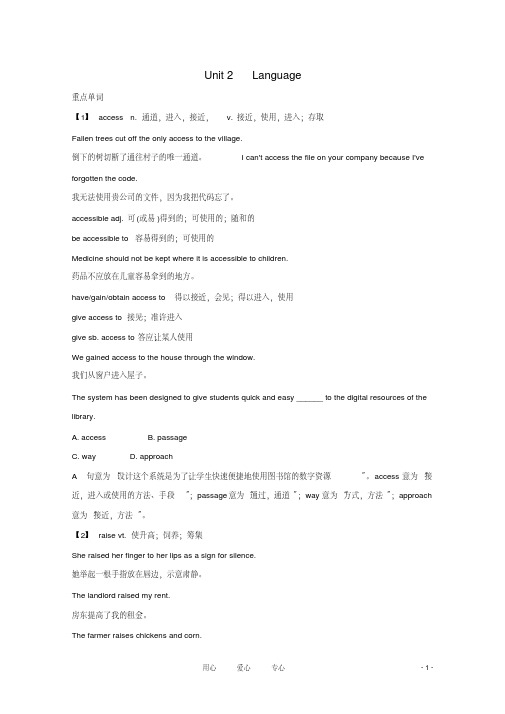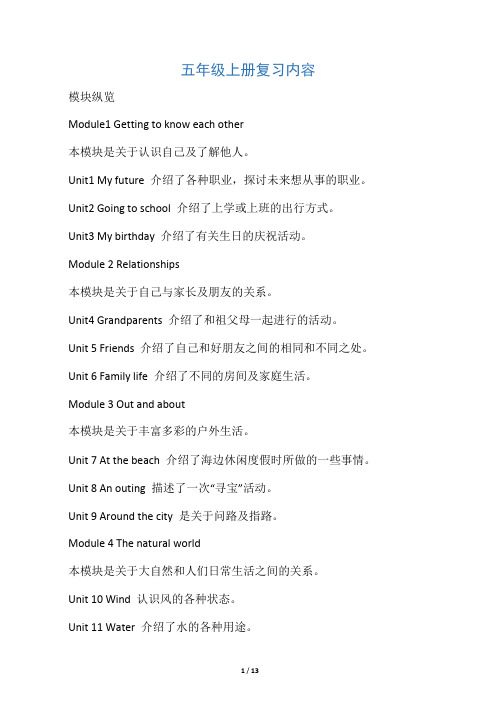江苏牛津英语Module3-Unit 2 复习提纲
牛津英语3单元知识点归纳

牛津英语3单元知识点归纳第一单元:Greeting and Meeting(问候与见面)1. 问候语:Hello! Hi! Good morning/afternoon/evening! How are you?回答问候:I'm fine, thank you. / I'm great. / Not bad.2. 自我介绍:What's your name? My name is _____. / I'm _______.询问对方姓名:What's your name? / Can I have your name, please?回答对方姓名:My name is _______.3. 打招呼:Nice to meet you. / Pleased to meet you.回答打招呼:Nice to meet you, too.4. 询问他人身份:Where are you from? / What nationality are you?回答自己身份:I'm from _______. / I'm ________.5. 用于对话或会话中的常见礼貌用语:Please. / Thank you. / Excuse me. / Sorry.6. 告别语:Goodbye! Bye! See you later. / See you soon.再次告别:Goodbye! / Take care! / Have a nice day!第二单元:Home and Family(家庭和家人)1. 家居物品:table, chair, bed, desk, bookshelf, sofa家居区域:kitchen, living room, bedroom, bathroom, dining room2. 家庭成员:father, mother, brother, sister, grandparents, aunt, uncle, cousin具体称呼:dad, mom, grandpa, grandma, auntie, uncle, etc.3. 家庭活动:watch TV, play games, cook, eat together, read books4. 询问他人家人情况:How many people are there in your family? / Do you have any siblings?回答自己家人情况:There are _____ people in my family. / I have _________. 第三单元:School(学校)1. 学校设施:classrooms, library, computer lab, playground, schoolyard学校地点:on the first/second floor, in front of/behind the school2. 学习科目:maths, English, science, art, PE (physical education), music学习活动:read books, write, draw, sing songs, dance3. 询问他人学校情况:What school do you go to? / Is it a big school?回答自己学校情况:I go to ________ school. / Yes, it's a big school.4. 描述学校日常活动:We have classes in the morning. / We play during break time.第四单元:Food and Drinks(食物和饮料)1. 食物种类:rice, noodles, bread, chicken, fish, vegetables, fruit, eggs, milk, juice饮料种类:water, cola, tea, coffee, hot chocolate, lemonade2. 询问他人喜好食物:What's your favorite food? / Do you like ________?回答自己喜好食物:My favorite food is _______. / Yes, I like _______.3. 描述食物味道:It's delicious. / It tastes great. / It'sspicy/salty/sweet/sour.描述饮料味道:It's refreshing. / It's hot/cold. / It's sweet/bitter.4. 用于进餐时的礼貌用语:Please pass me the _______. / Thank you for the meal.第五单元:Animals(动物)1. 动物种类:dog, cat, rabbit, bird, fish, tiger, lion, giraffe, elephant宠物种类:hamster, guinea pig, parrot, turtle, goldfish2. 描述动物特征:big, small, tall, short, long, fast, slow, noisy, quiet, cute3. 喜欢或不喜欢动物:I like _______. / I don't like _______. / Do you like_______?4. 询问他人是否养宠物:Do you have any pets? / What pets do you have?回答自己是否养宠物:Yes, I have _______. / No, I don't have any pets.以上是牛津英语3单元的知识点归纳,包括问候与见面、家庭和家人、学校、食物和饮料以及动物等方面的基础内容。
牛津英语模块三unitunit知识点

Unit 1 The world of our senses (Module 3)【考点释析】1. How far are you going?(P2)how far 问距离有多远How far is it from your home to school?【拓展】how long 问做某事等持续多长时间how soon 问某事或动作等多久以后才发生how often 问某事或动作等多久发生一次①— How long have you been here?— For five years.②— How soon will you be back?— In a month.”③— How often do you go back home?— Once a month.2. As Polly observed the passengers on the train, she sensed that she was being watched by a tall man in a dark coat.①observe “看到,注意到”,常用结构:observe sb /sth doing / do sth;observe + clauseThe police observed the man entering / enter the bank.The woman was observed to follow him closely.She observed that he had left but made no comment.She observed how he operated the computer.②sense “意识到,感觉到”Although she didn’t say anything, I sensed (that) she didn’t like the idea.【拓展】make sense 有意义;意思清楚;有道理make sense of 搞清…的意思,理解;懂;明白have no sense of shame 没有羞耻感3. She could feel her heart beating with fear.她能感到由于害怕自己的心脏在砰砰乱跳。
苏教牛津译林高中英语模块3_精品资源:Unit2_Word_power_考点归纳拓展

精品资源:Unit2 Word power 考点归纳拓展1.concern n.关心;忧虑,担心vt.涉及;使担忧;对……感兴趣(一)背诵佳句培养语感(教材原句)King Henry Ⅶwas a poet who showed great concern for language.国王亨利七世是一位非常关注语言的诗人。
(鲜活例句)Kate's behaviour at school is starting to concern her parents.凯特在学校的表现开始使她的父母担心起来。
(二)归纳拓展全析考点①Some people don't show much concern for our environment.有些人不太关心我们的环境。
②She is always concerning herself about other people's business.她总是担心别人的事情。
③Police said they were_very_concerned_about the boy's safety.警察说他们很担心那男孩的安全。
④Everyone who was directly concerned in the incident has now resigned.所有与该事件有直接牵连的人现在均已辞职。
2.ban vt.& n.禁止;取缔(一)背诵佳句培养语感(教材原句)At one time the department banned some‘borrowed words’ from English, including ‘weekend’ and ‘email’.政府曾经禁用一些英语外来词,包括weekend和e-mail.(鲜活例句)There is a ban on smoking in theatres.剧院里禁止吸烟。
牛津英语模块三Unit2Reading

Sentence translation
提升句子翻译能力
通过将英文句子翻译成中文,学生可以加深对英文句子结构和表达方式的理解,同时提高自己的翻译技巧和语言转换能力。
04
Cultural background expansion
Background of British Literature
Periods of British Literature: The history of British literature can be divided into several periods, including the Medieval, Renaissance, Enlightenment, Victorian, and Modern periods. Each period has its unique characteristics and significant works.
要点二
"Utopia" by Sir Thomas More
This 16th-century work is a description of an ideal society and is considered one of the first examples of utopian literature.
Evaluate the importance of positive mindset in maintaining a healthy lifestyle and its application in daily life.
02
Text Analysis
Article structure
Introduction
Classic Literature: British classic literature includes works such as Shakespeare's plays, the poetry of John Milton, and the novels of Jane Austen. These works have had a profound impact on world literature.
《夺冠之路》江苏省高考英语一轮复习Module3Unit2Language精品学案牛津译林版

Unit 2 Language重点单词【1】access n. 通道,进入,接近,v. 接近,使用,进入;存取Fallen trees cut off the only access to the village.倒下的树切断了通往村子的唯一通道。
I can't access the file on your company because I've forgotten the code.我无法使用贵公司的文件,因为我把代码忘了。
accessible adj. 可(或易)得到的;可使用的;随和的容易得到的;可使用的be accessible to…Medicine should not be kept where it is accessible to children.药品不应放在儿童容易拿到的地方。
得以接近,会见;得以进入,使用have/gain/obtain access to…接见;准许进入give access to…give sb. access to 答应让某人使用We gained access to the house through the window.我们从窗户进入屋子。
The system has been designed to give students quick and easy ______ to the digital resources of the library.A. accessB. passageC. wayD. approachA句意为“设计这个系统是为了让学生快速便捷地使用图书馆的数字资源”。
access意为“接近,进入或使用的方法、手段”;passage意为“通过,通道”;way意为“方式,方法”;approach 意为“接近,方法”。
【2】raise vt. 使升高;饲养;筹集She raised her finger to her lips as a sign for silence.她举起一根手指放在唇边,示意肃静。
牛津沪教版英语八年级下 module 3 Unit 2 复习

八年级下U3L2Step 1 Vocabularies1.suddenly ['sʌd(ə)nlɪ] adv. 突然地;忽然e.g.Suddenly, she looked ten years older.突然间,她看上去老了10岁。
Her expression suddenly altered.她的表情突然变了。
outside [aʊt'saɪd; 'aʊtsaɪd] adj. 外面的,外部的;外来的;n. 外部;外观;adv. 在外面,向外面;在室外prep. 在…范围之外e.g. I stepped outside and pulled up my collar against the cold mist.我走到外面,拉起衣领以抵御寒雾。
Outside, the light was fading rapidly.在外面,光在快速消失。
3.wish [wɪʃ] n. 希望;祝福;心愿;vt. 祝愿;渴望;向…致问候语;vi. 愿望;需要e.g. She was sincere and genuine in her wish to make amends for the past.她诚恳而真心地希望弥补过去的错误。
The decision was made against the wishes of the party leader.这项决定是在违背该党领袖愿望的情况下作出的。
4.afford [ə'fɔːd] vt. 给予,提供;买得起e.g. My parents can't even afford a new refrigerator.我父母甚至买不起一台新冰箱。
The arts should be available to more people at prices they can afford.艺术品应该以人们支付得起的价格提供给更多人。
5.forget [fə'get] vt. 忘记;忽略;vi. 忘记e.g.She forgot where she left the car and it took us two days to find it.她忘了把车停在了哪里,我们花了两天时间才找到它。
牛津英语五年级上册知识点整理

五年级上册复习内容模块纵览Module1 Getting to know each other本模块是关于认识自己及了解他人。
Unit1 My future 介绍了各种职业,探讨未来想从事的职业。
Unit2 Going to school 介绍了上学或上班的出行方式。
Unit3 My birthday 介绍了有关生日的庆祝活动。
Module 2 Relationships本模块是关于自己与家长及朋友的关系。
Unit4 Grandparents 介绍了和祖父母一起进行的活动。
Unit 5 Friends 介绍了自己和好朋友之间的相同和不同之处。
Unit 6 Family life 介绍了不同的房间及家庭生活。
Module 3 Out and about本模块是关于丰富多彩的户外生活。
Unit 7 At the beach 介绍了海边休闲度假时所做的一些事情。
Unit 8 An outing 描述了一次“寻宝”活动。
Unit 9 Around the city 是关于问路及指路。
Module 4 The natural world本模块是关于大自然和人们日常生活之间的关系。
Unit 10 Wind 认识风的各种状态。
Unit 11 Water 介绍了水的各种用途。
Unit 12 Fire 介绍了一些基本的防火知识。
第一单元复习词组Jump into the lake fly a plane cook nice food(be)afraid of flying help people drive a taxi(be)good at...句型用What do you want to be ?询问对方将来想从事的职业。
用I want to be ...及I want to (do)...介绍自己未来想从事的职业及理由。
难点1)当句子主语为第三人称单数时,动词要做适当的变化。
2)want to do 与want to be 的正确用法。
江苏牛津英语Module1-Unit 3 复习提纲

Module 1--- Unit 3 复习提纲一.重点词组1.work out: 制定出;算出;解决;锻炼2.go on diets: 节食3.in secret: 秘密地4.side effect: 副作用5.put on weight: 增加体重6.lose weight: 减轻体重7.alone with: 连同……;随同……8.in the long term: 从长远角度看9.as a matter of fact: 事实上10.in fact: 事实上11.in no time: 立刻,马上12.run after: 追13.on average: 平均14.in support of: 支持15.shoulder by shoulder: 肩并肩16.keep fit: 保持健康17.every minute counts: 每一分钟都很重要(count: Vi 很重要)二.辨析work out: 制定出;算出;解决;锻炼1. work on: 从事……;继续……work at: 从事……;研究……work: 起作用,有效例:A utopian plan just won’t work. 空想的计划是不行的。
consider… astreat … asregard … as2. 把……看作think of … aslook on … asaccept … asrecognize … asin no time: 立刻,马上all the time: 一直for the time being: 暂且3. at the same time: 同时from time to time:不时,偶尔time and time again: 一再at no time: 任何时候都不at a time: 每次at one time: 曾经,一度at times: 有时take in:欺骗;吸收,接纳;领会,理解take off:起飞;脱下take on:呈现,具有;承担,从事;开始雇用4. take over:接管,接收take up:从事;占据take… for granted:想当然地,认为……理所应当take apart: 拆卸,拆开5. remain的用法*1. Vi, 不及物动词,因此不能跟宾语,也不用被动语态。
- 1、下载文档前请自行甄别文档内容的完整性,平台不提供额外的编辑、内容补充、找答案等附加服务。
- 2、"仅部分预览"的文档,不可在线预览部分如存在完整性等问题,可反馈申请退款(可完整预览的文档不适用该条件!)。
- 3、如文档侵犯您的权益,请联系客服反馈,我们会尽快为您处理(人工客服工作时间:9:00-18:30)。
Module 3--- Unit 2 复习提纲
一.词组
1.in a sense: 在某种意义上
2. a form of: 一种…的形式
3.in circles: 以圆圈的形式
4.be made up of: 由…组成
5.consist of: 由…组成
6.make up: 组成,构成; 捏造,编造; 化妆; 补充,补足
7.make up for: 弥补
8.mix…with…: 把…和…混合
9.the official language: 官方语言
10.contribute to: 归功于, 归因于; 贡献
11.take control of: 控制
12.replace…with…: 用…替换….
13.have an impact/influence/effect on: 对….有影响
14.result in: 导致=lead to
15.result from: 由于….的原因
16.mother tongue: 母语
17.because of: 因为
18.in the future:将来
19.take the place of: 代替
20.rely on=depend on: 依靠,取决于
21.in addition: 另外
22.throw away: 扔掉
23.have a word with: 与某人谈话
24.look forward to: 盼望(*to是介词)
e true: 实现(*不及物动词词组)
26.a waste of: ….的浪费
27.at one time: 曾经,一度
28.due to: 归因于
29.care about: 关心,关注
30.look up: 查阅, 尊敬
31.as a whole: 总体上
32.differ from:与…不同
33.turn into: 把…变成
二.辨析
1.raise/rise
●raise. Vt :举起; 抚养
●rise. V i: (太阳,国旗等)升起
2.in future: 以后(从现在开始)
in the future: 将来(在将来的某个时候)
3.take place: 发生
take the place: 替代,取代
4.turn up: 出现;(音量等)调高
turn down: 拒绝; (音量等)调低
turn off: 关闭(电源,水源等); 拐弯
turn on: 打开
turn in: 上交
turn to: 求助于; 翻到;
turn over: 翻过来;移交,转交
turn out: 结果是, 证明是
5.at a time: 一次, 每次
at one time: 曾经, 一度, 从前
at times: 有时、间或=sometimes
at no time: 在任何时候都不、决不
at the same time: 同时
at all times: 一直、随时
6.agree to: 作“同意”讲,后一般接计划、安排、建议、意见、条件等的名词或动词原形,
含“经过争论或讨论改变了看法而表示同意,愿意协助工作”之意。
(to是介词) agree with: 同意某人或某人的话,观点等
※适合于、适宜于(人的胃口, 天气气候等)
agree on: 指双方或各方经过“协商”而后“达成一致”
agree to do sth: 同意做某事
7.本单元易混淆的单词
●Germany noun.
German adj.
●difficulty noun.
difficult adj.
●safety noun.
Safe adj.。
